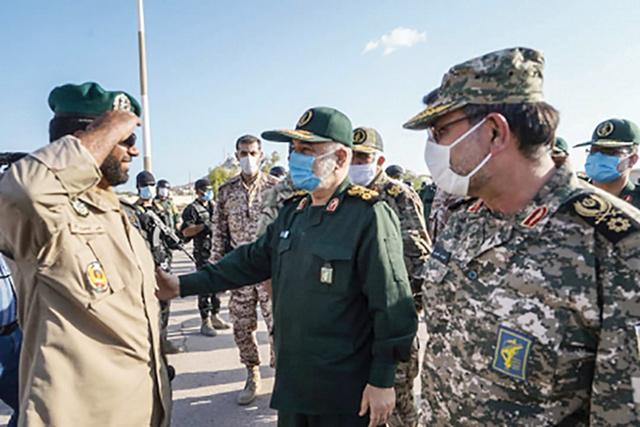- International News
- Sun-2021-01-03 | 02:42 pm

Iran's Revolutionary Guards chief Hossein Salami vowed on Saturday to respond to any "action the enemy takes", as he visited a strategic Gulf island amid rising tensions with the US.
Salami was speaking on the eve of the first anniversary of the US killing of top Iranian military commander Qassem Soleimani in a Baghdad drone strike on January 3, 2020.
"We are here today to evaluate and be assured of our powerful capabilities at sea and against enemies who sometimes boast... and threaten," Salami said, according to the Guards' official website Sepahnews.
Salami inspected troops stationed on Abu Musa island, accompanied by the Revolutionary Guard Corps navy commander Rear Admiral Alireza Tangsiri.
"We would respond with a reciprocal, decisive and strong blow to whatever action the enemy would take against us," Salami warned.
Abu Musa and the Greater and Lesser Tunb islands are located in the Gulf near the entrance to the strategic Strait of Hormuz, through which a fifth of world oil output passes.
The islands are under Iranian control but are also claimed by the United Arab Emirates.
Tensions have been building in the run-up to the anniversary of Soleimani's killing, with two US B-52 bombers recently flying over the region.
On Thursday, Iran's Foreign Minister Mohammad Javad Zarif accused outgoing US President Donald Trump of aiming to fabricate a "pretext for war" after Trump blamed Tehran for a rocket strike on the US embassy in Baghdad on December 20.
And on Saturday Zarif claimed that in Iraq "Israeli agent-provocateurs are plotting attacks against Americans [to put] Trump in a bind with a fake casus belli."
"Be careful of a trap," Zarif tweeted at Trump, saying that "any fireworks will backfire badly, particularly against your same BFFs."
The aircraft carrier USS Nimitz has been patrolling Gulf waters since late November, but US media reported this week that acting US defence secretary Christopher C. Miller had ordered the vessel to return home.
The New York Times, quoting US officials, said the move was a "de-escalatory” signal to Tehran to avoid conflict in Trump’s last days in office.
Trump oversaw a sharp toughening of US policy, abandoning a landmark nuclear deal between Iran and world powers in 2018 and reimposing crippling unilateral sanctions.
The two countries have twice come to the brink of war since June 2019.
Days after Soleimani’s assassination, Iran launched a volley of missiles at Iraqi bases housing US and allied troops, with Trump refraining from any further military response.
On December 25, the Guards naval chief visited the other two islands also claimed by the UAE and emphasised the importance of their garrisons’ "combat-readiness and awareness”, Iran’s ISNA news agency reported.













